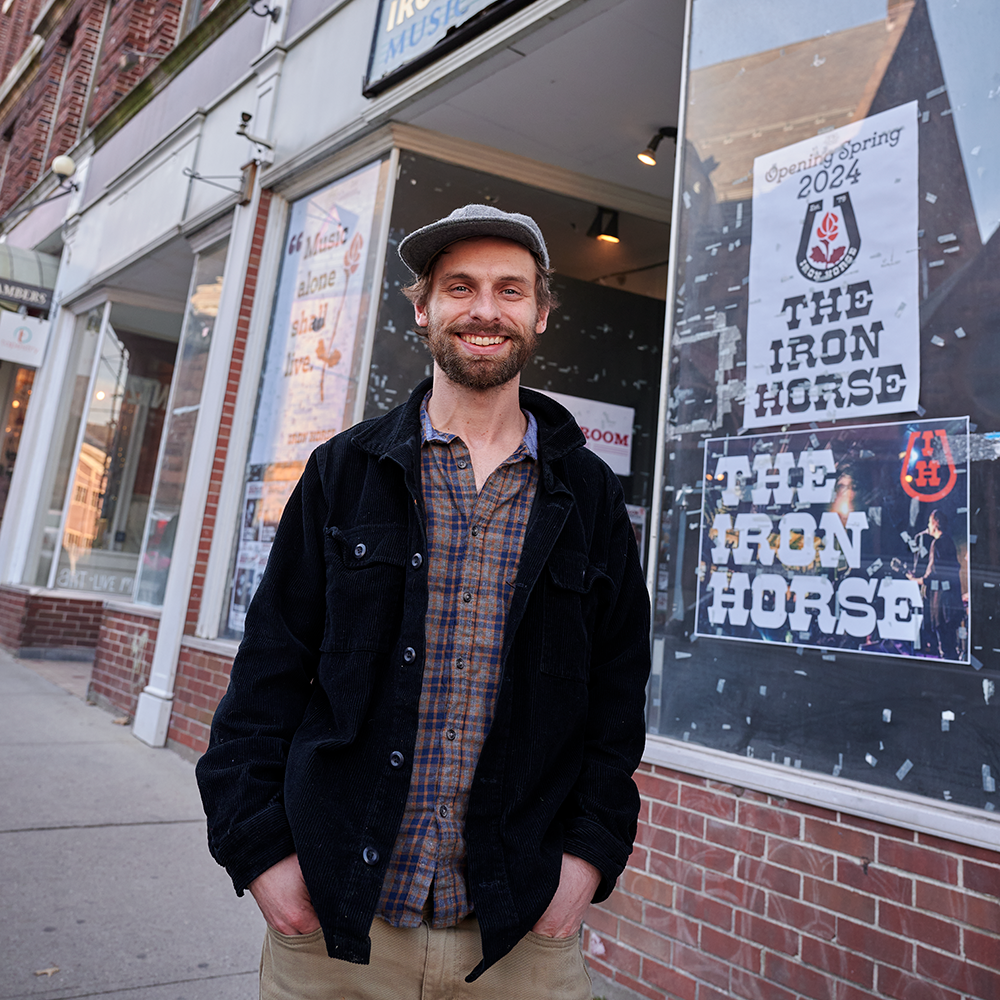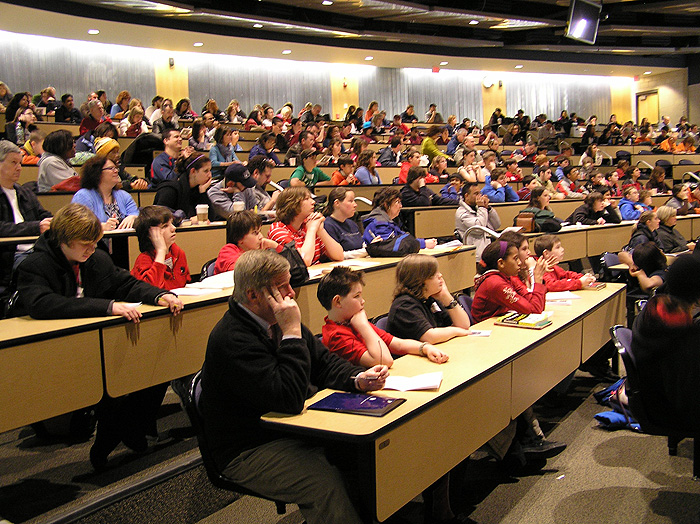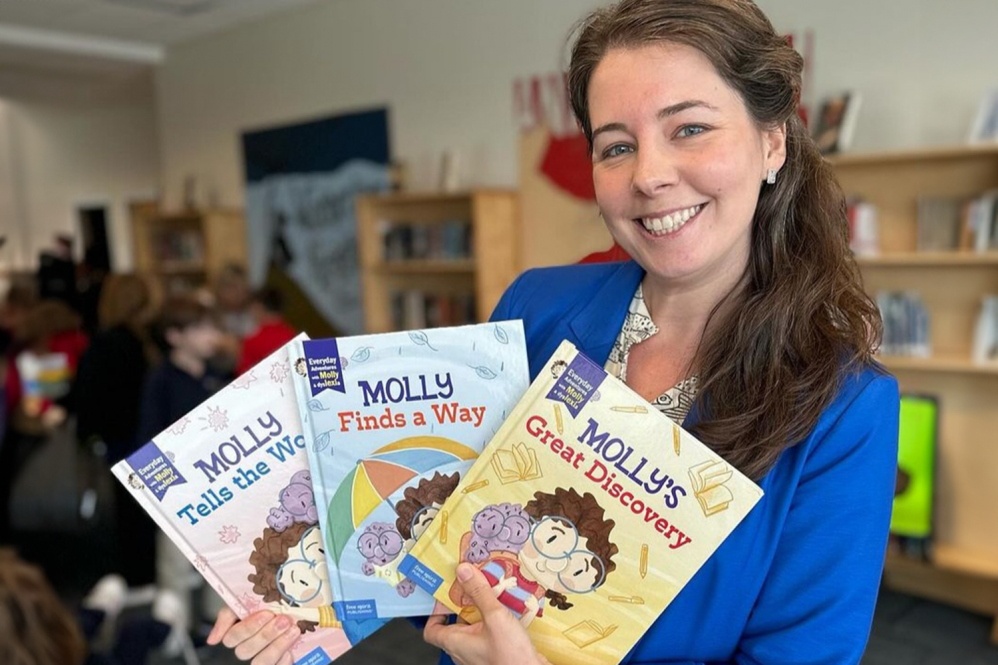this is some text
Checking In WithThe Frontman
 Northampton’s iconic Iron Horse music hall has been shuttered since March 2020. Freeman, of the UConn band Poor Old Shine, is raising money to bring the music back.
Northampton’s iconic Iron Horse music hall has been shuttered since March 2020. Freeman, of the UConn band Poor Old Shine, is raising money to bring the music back.
Chris Freeman ’12 (CLAS) grew up in Farmington, Connecticut, the son of a lawyer and a health care manager. At age 13, his father, the lawyer, brought him up to The Iron Horse in Northampton, Massachusetts, to see Big Al Anderson of NRBQ. From that point on Freeman knew he wanted to be a musician.
“I was an English major at UConn,” he says, “but the whole time I was going to be a musician. I was going to be in a band. I knew that’s what I wanted to do.”
As a freshman, he joined the men’s a capella group CDN, then found his true love as a member of The UConn Folk Music Society, which met on Tuesday nights in the Student Union. “It was a group of folk musicians with guitars and banjos and mandolins. Someone might play Irish music. Once a guy played clawhammer banjo, and I’d never seen a hand move like that before – it was a profound moment for me. Over the next two years, that club got mistaken as a band, but it was just the jam that ended the night. We’d play anything – except ‘Wonderwall.’”
Freeman’s legendary UConn indie rock band Poor Old Shine (later Parsonsfield) evolved from there. “We played all over. Any big student festival. South-a-Palooza on South Lawn. UConn-a-Roo outside the Student Union. We played at the Coventry Farmers Market. We played anywhere anyone would have us in Connecticut. Once we graduated, we made a really crappy business plan and decided none of us were going to apply for jobs. We found a house on Storrs Road for $300 a month. It had no heat. There was a river running through the basement.”
Rescue came in the form of a two-year gig writing the music for, and performing in, a musical called “The Heart of Robin Hood,” which started at the A.R.T. in Cambridge before touring to Winnipeg and Toronto. “We were on the stage as part of the show. We had actors who ended up winning Tony awards.”
It meant steady money and steady gigs in 1,000-plus-seat theaters. Albums and tours ensued, with the requisite highs – like flying to Alberta, Canada, to play for some 7,000 people at the Edmonton Folk Festival. And lows – like a gig in Omaha with seemingly more people in the band than the audience, where a 4-year-old climbed up on stage and played the drums during an acoustic set or the time they drove all night from Nashville to New Jersey and Freeman woke up in the back of the van only to discover the vehicle had broken down and was up on the hoist in a repair shop.
By the time COVID forced the band to reassess, the thrill of being a touring musician had been wearing off for Freeman. “The constant travel just got to me, and I realized the thing that was missing: that it’s really important to me to feel connected to a community where I actually live.”
Early last year Freeman became executive director of The Parlor Room, a nonprofit that books shows and runs a musical education program in Northampton. In the fall, it purchased The Iron Horse, as iconic to the town as The Hollywood Bowl is to Hollywood or The Apollo Theatre is to Harlem. Freeman is working to raise $750,000 to reclaim and reconfigure the venue he visited at age 13 with his dad, starting with a new kitchen and bathrooms on the ground floor. The hope is to begin booking shows for May.
“Our mission is to enhance the health and vitality of our community through the power of music. If it means giving somebody the opportunity to see an incredible musician up close, when they’ve only been to huge concerts, that is a whole crazy experience.” An experience with a ripple effect, he says: It directly helps the audience members and the artists, as well as the community and the city of Northampton.
“People have moved here because of music and art. Given the state of things, the empty storefronts you see, art and music are the ticket to the economic revitalization of Northampton,” says Freeman, adding that it won’t happen by booking venues with cover bands, but by introducing new generations of bands. “There’s magic that happens here, every night. We’ve had High Tea and we’ve had Wallace Field, both doing their album releases [at The Parlor Room].”
Between overseeing educational programming, fundraising and seeking new members and donors, supervising construction, booking shows, and fielding pitches from musicians looking for gigs (but don’t send him a CD; he doesn’t have a CD player), Freeman is über busy – and happily so.
“We’re doing this to enrich the community. The Iron Horse has an identity. It represents the whole area. Maybe The Parlor Room will be where people play their first gig, and The Iron Horse will be for acts and bands that have a following.” Freeman himself chose Northampton for its musical identity.
“Being on the road, in my van, I was disconnected from a sense of community. I was unrooted. The unique part of the band, at UConn, was being embraced and supported by the local community. We were mission-based, too, in a sense, making music for UConn and the people in the area. But the bigger the band got, the more we traveled and toured, the less I felt that. Here, I’m giving something back that people want. That’s what musicians do. You’re providing a service for people. What I was doing at UConn was really rewarding, and this is a continuation of that.”
By Peter NelsonPhoto by Peter Morenus

